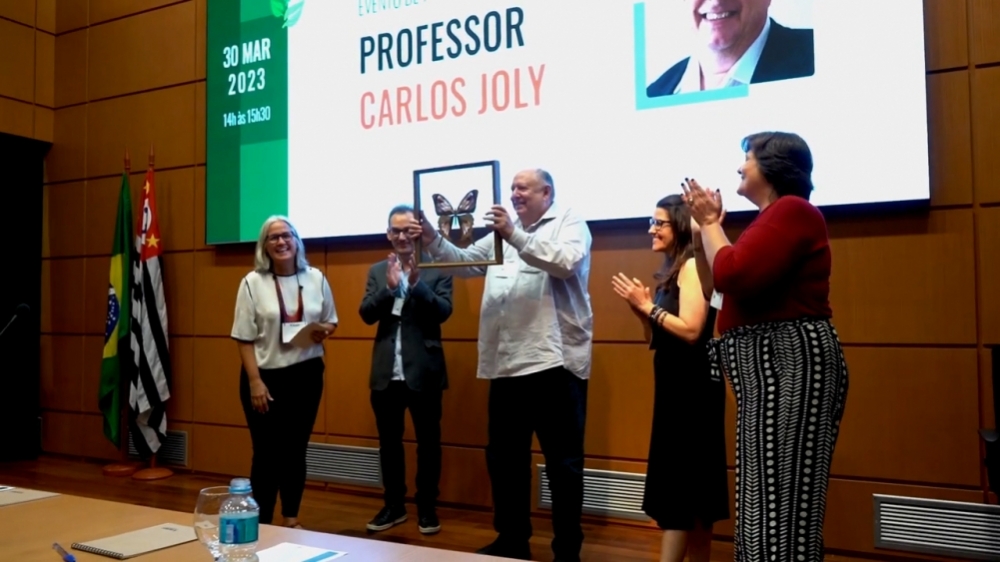

An event was held at FAPESP to pay tribute to the emeritus professor at the State University of Campinas who created the FAPESP Research Program on Biodiversity Characterization, Conservation, Restoration and Sustainable Use in 1999 (image: Agência FAPESP)
An event was held at FAPESP to pay tribute to the emeritus professor at the State University of Campinas who created the FAPESP Research Program on Biodiversity Characterization, Conservation, Restoration and Sustainable Use in 1999.
An event was held at FAPESP to pay tribute to the emeritus professor at the State University of Campinas who created the FAPESP Research Program on Biodiversity Characterization, Conservation, Restoration and Sustainable Use in 1999.

An event was held at FAPESP to pay tribute to the emeritus professor at the State University of Campinas who created the FAPESP Research Program on Biodiversity Characterization, Conservation, Restoration and Sustainable Use in 1999 (image: Agência FAPESP)
By André Julião | Agência FAPESP – The ability to bring together scientists in different areas with decision makers, considered fundamental to the creation of public policies based on scientific evidence, is one of the hallmarks of Carlos Joly’s leadership of the FAPESP Research Program on Biodiversity Characterization, Conservation, Restoration and Sustainable Use (BIOTA-FAPESP), which he established in partnership with other researchers in 1999. Joly is an emeritus professor at the State University of Campinas’s Institute of Biology (IB-UNICAMP).
Joly’s people skills were warmly praised by the participants in an event held on March 30 to pay tribute to him as he stepped down from the leadership of BIOTA-FAPESP after more than two decades of dedication.
“He’s a great scientist with an outstanding international reputation and is leaving us a magnificent legacy in the shape of BIOTA-FAPESP,” said Marco Antonio Zago, President of FAPESP, in an opening video. “Of course, a large number of people have taken part in the program, but that’s also due in great measure to Joly’s ability to bring people together and encourage everyone to contribute whatever they can.”
Joly himself recalled how the “BIOTA journey” began in the same auditorium in March 1999. “The idea of integration was foremost,” he said. Before that, in conversations with Naércio Menezes, a professor at the University of São Paulo’s Zoology Museum (MZ-USP) then in charge of funding research in biological sciences at both FAPESP and the National Council for Scientific and Technological Development (CNPq, an arm of the Brazilian Ministry of Science, Technology and Innovation, MCTI), Joly had lamented the difficulty of applying knowledge produced by research in the field owing to its fragmented state.
BIOTA has since contributed to São Paulo state’s environmental legislation, funded many research projects on Brazilian biodiversity and assembled researchers in a wide array of fields, integrating knowledge on the various facets of biological diversity in natural and social sciences.
BIOTA Synthesis, launched in 2022, is one of FAPESP’s Science for Development Centers (SDCs), connecting researchers at universities in São Paulo state with the state government’s environment, agriculture and health departments, as well as non-governmental organizations (NGOs), in pursuit of solutions to practical problems involving biodiversity in the state (read more at: agencia.fapesp.br/38760).
“BIOTA is unquestionably the greatest legacy of my scientific career. It’s been a huge pleasure to work in it for all these years,” Joly said.
Trailblazer
Luiz Eugênio Mello, Scientific Director of FAPESP, recalled that BIOTA was FAPESP’s first research program and inspired the creation of several others, such as the FAPESP Research Program on Global Climate Change (RPGCC), the FAPESP Bioenergy Research Program (BIOEN) and the FAPESP Research Program on eScience and Data Science.
“FAPESP will never be able to repay and reward what Joly has given. A ceremony like this is just a drop in the ocean,” Mello said.
Jean Paul Metzger, a professor at USP’s Institute of Biosciences, a member of BIOTA’s steering committee and the head of BIOTA Synthesis, highlighted the program’s importance as a trailblazer. It introduced a new universe, he said, in which people from different fields joined forces to work toward a common objective.
“Fifteen years ago, BIOTA was already funding research that contributed to the formulation of public policies,” he noted, after expressing his personal gratitude for all the support he received from Joly throughout his career.
Vanderlan Bolzani, a professor at São Paulo State University’s Araraquara Institute of Chemistry (IQAr-UNESP), recalled Joly’s scientific trajectory and the support he gave to the introduction of prospecting for natural products into the program’s scope. An event was held to pay tribute to Bolzani at the end of 2022 when she stepped down from BIOTA’s steering committee.
“UNESP now has an internationally recognized laboratory and library of natural products from Brazilian biodiversity, all made possible by BIOTA,” Bolzani told Agência FAPESP.
Bráulio Ferreira de Souza Dias, a professor at the University of Brasília (UnB), recalled Joly’s participation in international conventions on climate change and biodiversity, and the groundbreaking role played by BIOTA in funding activities aligned with the same goals.
The tribute ended with a video of testimonials by collaborators, former students and colleagues who spoke of various aspects of Joly’s work and how he influenced their own careers.
A complete recording of the event can be watched at: www.youtube.com/watch?v=Voah_hcjp6I.
Republish
The Agency FAPESP licenses news via Creative Commons (CC-BY-NC-ND) so that they can be republished free of charge and in a simple way by other digital or printed vehicles. Agência FAPESP must be credited as the source of the content being republished and the name of the reporter (if any) must be attributed. Using the HMTL button below allows compliance with these rules, detailed in Digital Republishing Policy FAPESP.





